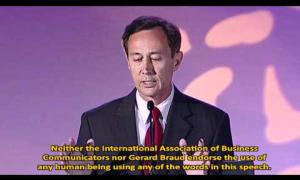What’s your “personal brand”?
July 24, 2019
Speechwriters may loathe the term "personal branding." But is the concept one they can afford to ignore?
Speechwriter: In early July, I wrote the following on my personal blog, Writing Boots. Re-reading it with speechwriters in mind, I wondered if a member of an ill-defined craft does need to do a little "personal branding" (whether you call it that or not), inside the organization, at least. I'd welcome your thoughts. —DM
***
Anyone who uses the term "personal brand" with a straight face is an jerk, everybody knows that.
But why?
I always thought it was because it sounded vain and shallow.
But there's another reason: For anyone with a personality more multi-dimensional than that of a squirrel, managing a personal brand is also ridiculous.
"How will I be remembered when I die?" asked the social psychologist Robert Levine, who died last month. "Will there be an iconic Bob Levine—the guy who looked the way I did at some flattering moment when I was twenty-one, or when I was forty-one—who somehow stood out in people's memories? Or will I be some kind of average me, as if all the people I've been were thrown into a blender?"
That's a tough question in death—and it's just as hard on LinkedIn!
Do I want you to see me as:
• A professional scholar of rhetoric?
• A colorful commentator on communication?
• A publisher and entrepreneur?
• An American journalist and essayist and memoirist?
• A warm and friendly and humble convener of other writers?
• A closet family guy, whose daughter and wife are his life?
• An adventurer who occasionally risks his life (and thus his daughter and wife)?
I want you to see me as all these things—because all these things are what I am. The only thing I don't want you to see me as is a guy who spends a lot of time cultivating his personal brand.
"My personal brand is large," Walt Whitman said. "It contains multitudes."
No, he didn't. Because he was not a jackass.
And because a personal brand can't contain all the dimensions (some of them contradictory) of a real person. The molding and the maintaining and the promotion and the re-shaping of one's persona is a creative cover-up operation: Don't show them this, don't show them that, give them a glimpse of the other—and try to seem a bit edgy.
The exercise is either all-consuming and ultimately bland, or it's merely hapless. Usually it's both.
Because you never have any idea who actually reads what about you, or whether it rubs them the right way or the wrong way. (For one infinitesimal instance: For every longtime friend and colleague who might celebrate my recent motorcycular ramble about Ecuador, a newly connected PSA member might naturally conclude that I'm an overpaid, underworked reckless clown who shouldn't be in charge of a do-it-yourself car wash, let alone an association of professional writers.)
Short of never doing or divulging anything the least bit objectionable, how would I possibly calculate the effects of all my activities, opinions or poses—let alone the combination of all of them!—upon my "personal brand."
Aside from not posting my very most personal stuff on LinkedIn and not bothering my Facebook friends with strictly work-related stuff, I sort of let it all hang out, and hope for the best.
Actually, I don't even bother hoping for the best.
The benefit of the doubt, more like.
My personal brand is one emission nebula in your head, and another one in another person's head, and now perhaps a little different in everybody's head for my having emitted this little essay.
Corporate branding is difficult.
Creating a personal brand for a corporate CEO is dicey. (How about a persona?)
Creating a personal brand for yourself is tying yourself up with twine, and slip knots. —DM


